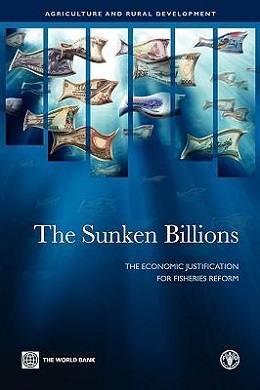The Sunken Billions
The Sunken Billions[edit | edit source]
"The Sunken Billions" is a comprehensive study that examines the economic losses incurred by the global fisheries sector due to overfishing and mismanagement. The report, published by the World Bank and the Food and Agriculture Organization (FAO), highlights the potential economic benefits of restoring fish stocks and improving fisheries management.
Overview[edit | edit source]
The report estimates that the global marine capture fisheries are losing billions of dollars annually due to inefficient practices and overexploitation of fish stocks. These losses, referred to as "sunken billions," represent the difference between the potential and actual economic benefits derived from the world's oceans.
Economic Impact[edit | edit source]
The study reveals that the global fisheries sector could increase its annual net benefits by approximately $50 billion if fish stocks were rebuilt and managed sustainably. This would involve reducing fishing efforts to allow fish populations to recover to optimal levels, thereby increasing the long-term productivity and profitability of fisheries.
Environmental and Social Implications[edit | edit source]
Overfishing not only leads to economic losses but also has significant environmental and social consequences. Depleted fish stocks can disrupt marine ecosystems, leading to a loss of biodiversity. Additionally, many coastal communities that rely on fishing for their livelihoods face increased poverty and food insecurity as fish stocks decline.
Recommendations[edit | edit source]
The report advocates for several key measures to address the challenges facing global fisheries:
- Improved Management: Implementing effective fisheries management practices, including setting catch limits based on scientific assessments and enforcing regulations to prevent illegal fishing.
- Restoration of Fish Stocks: Allowing overfished stocks to recover by reducing fishing pressure and protecting critical habitats.
- Economic Incentives: Providing incentives for sustainable fishing practices and investing in the development of alternative livelihoods for fishing communities.
Conclusion[edit | edit source]
"The Sunken Billions" underscores the urgent need for global action to reform fisheries management and restore fish stocks. By doing so, the world can unlock significant economic, environmental, and social benefits, ensuring the sustainability of marine resources for future generations.
Related Pages[edit | edit source]
Search WikiMD
Ad.Tired of being Overweight? Try W8MD's physician weight loss program.
Semaglutide (Ozempic / Wegovy and Tirzepatide (Mounjaro / Zepbound) available.
Advertise on WikiMD
|
WikiMD's Wellness Encyclopedia |
| Let Food Be Thy Medicine Medicine Thy Food - Hippocrates |
Translate this page: - East Asian
中文,
日本,
한국어,
South Asian
हिन्दी,
தமிழ்,
తెలుగు,
Urdu,
ಕನ್ನಡ,
Southeast Asian
Indonesian,
Vietnamese,
Thai,
မြန်မာဘာသာ,
বাংলা
European
español,
Deutsch,
français,
Greek,
português do Brasil,
polski,
română,
русский,
Nederlands,
norsk,
svenska,
suomi,
Italian
Middle Eastern & African
عربى,
Turkish,
Persian,
Hebrew,
Afrikaans,
isiZulu,
Kiswahili,
Other
Bulgarian,
Hungarian,
Czech,
Swedish,
മലയാളം,
मराठी,
ਪੰਜਾਬੀ,
ગુજરાતી,
Portuguese,
Ukrainian
Medical Disclaimer: WikiMD is not a substitute for professional medical advice. The information on WikiMD is provided as an information resource only, may be incorrect, outdated or misleading, and is not to be used or relied on for any diagnostic or treatment purposes. Please consult your health care provider before making any healthcare decisions or for guidance about a specific medical condition. WikiMD expressly disclaims responsibility, and shall have no liability, for any damages, loss, injury, or liability whatsoever suffered as a result of your reliance on the information contained in this site. By visiting this site you agree to the foregoing terms and conditions, which may from time to time be changed or supplemented by WikiMD. If you do not agree to the foregoing terms and conditions, you should not enter or use this site. See full disclaimer.
Credits:Most images are courtesy of Wikimedia commons, and templates, categories Wikipedia, licensed under CC BY SA or similar.
Contributors: Prab R. Tumpati, MD

